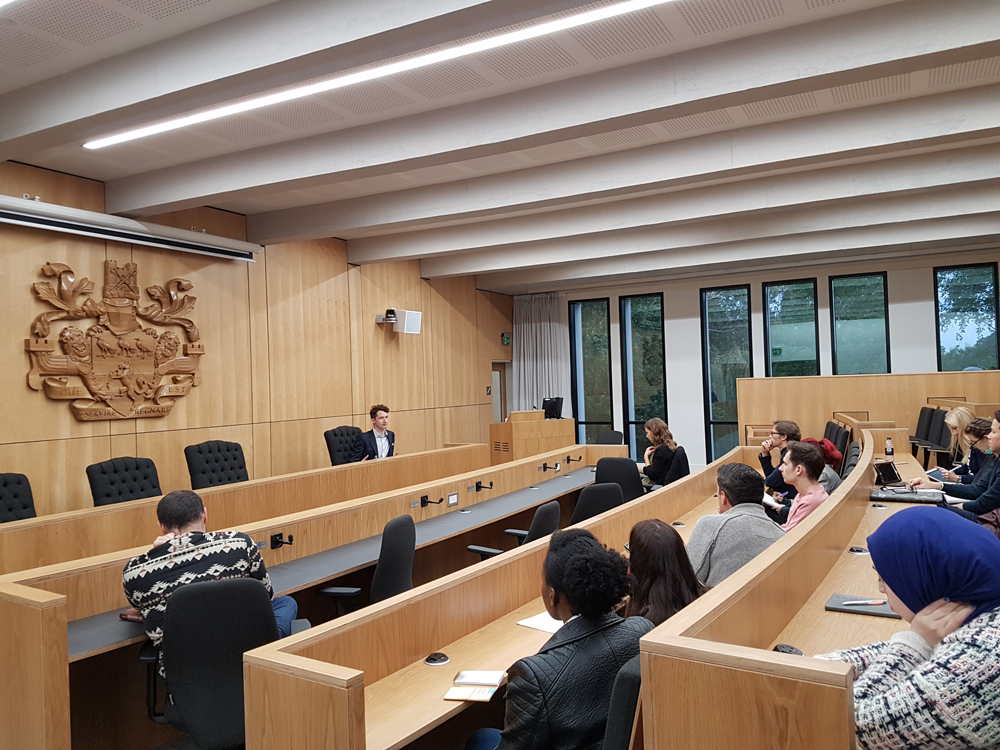A report by Eric Loefflad on a talk by Barrister Paul Clark of Garden Court Chambers for the Kent Centre for Critical International Law (CeCIL)
Kent Law School’s Centre for Critical International Law kicked off it’s lecture series for the 2017-18 academic year on Tuesday 3 October with a riveting talk from Barrister Paul Clark of Garden Court Chambers. It is CeCIL’s tradition to begin each year with a talk by a practitioner and, given Paul’s record of human rights and international criminal law litigation in a manner informed by the broad insights of Critical Legal Studies, he exemplifies the notion that ‘critical international law’ is in no way limited to abstract theories. In drawing upon his broad range of insights and experiences, Paul offered a fascinating perspective on the interconnected functions of state-actor immunity as it is currently evolving in both domestic and international legal orders.
In framing his discussion, Paul outlined two central justifications for why courts might refuse to impose liability on an individual by virtue of their position. On the one hand, there is an ‘effectiveness’ argument whereby it is claimed that the prospect of being subject to liability will stunt the ability of certain important public officials to do their job. On the other hand, there is the systemic argument rooted in the fundamental concept of sovereign equality whereby states are presumed to be incapable of judging one another’s official acts. It is the later concept of immunity that has drawn much critical attention by human rights activists who argue that the demands of cosmopolitan justice require that the rigid protection of sovereignty be reconsidered in the name of protecting individuals who have suffered grave abuses.
In evaluating these claims, Paul rejects the logic of the ‘effectiveness’ argument by bringing up the example of police immunity which applies in case of negligence but does not cover intentional actions including assault and false-imprisonment. Yet, despite this possibility of liability, policing can nonetheless be performed effectively. That said, in moving on to the systemic, sovereign equality-based justification, Paul turned our attention to the difficult cases that blur the boundaries between domestic and international. Such issues often arise in employment cases that concern claims by individuals working for diplomats, embassies and international organisations. In synthesizing the case law, Paul noticed a trend whereby liability has been imposed on otherwise immune individuals on the grounds that the harm they caused was done in a personal capacity outside the scope of their sovereign function.
In reflecting on this situation, Paul notes that this narrative contradicts the liberal cosmopolitan narrative of ‘declining sovereignty.’ After all, finding immunity-protected officials liable for acting as private individuals, as opposed to agents of a sovereign power, leaves the notion of sovereignty/sovereign immunity completely intact. Moreover, from the perspective of a politically-motivated practitioner a moral dilemma is raised by these cases that often forces lawyers to choose between getting the best remedy for their client and advancing the progressive development of the law. After all, alleging a claim against a state actor as a routine employment law claim that affirms the existing order can easily preclude the assertion of a much more risky international human rights claims that seeks to fundamentally transform the relationship between state sovereignty and individual autonomy. While there is no easy answer here, Paul’s talk certainly provides us with new ways of thinking through the deeper structural issues presented by routine questions of immunity and its role within global governance.

